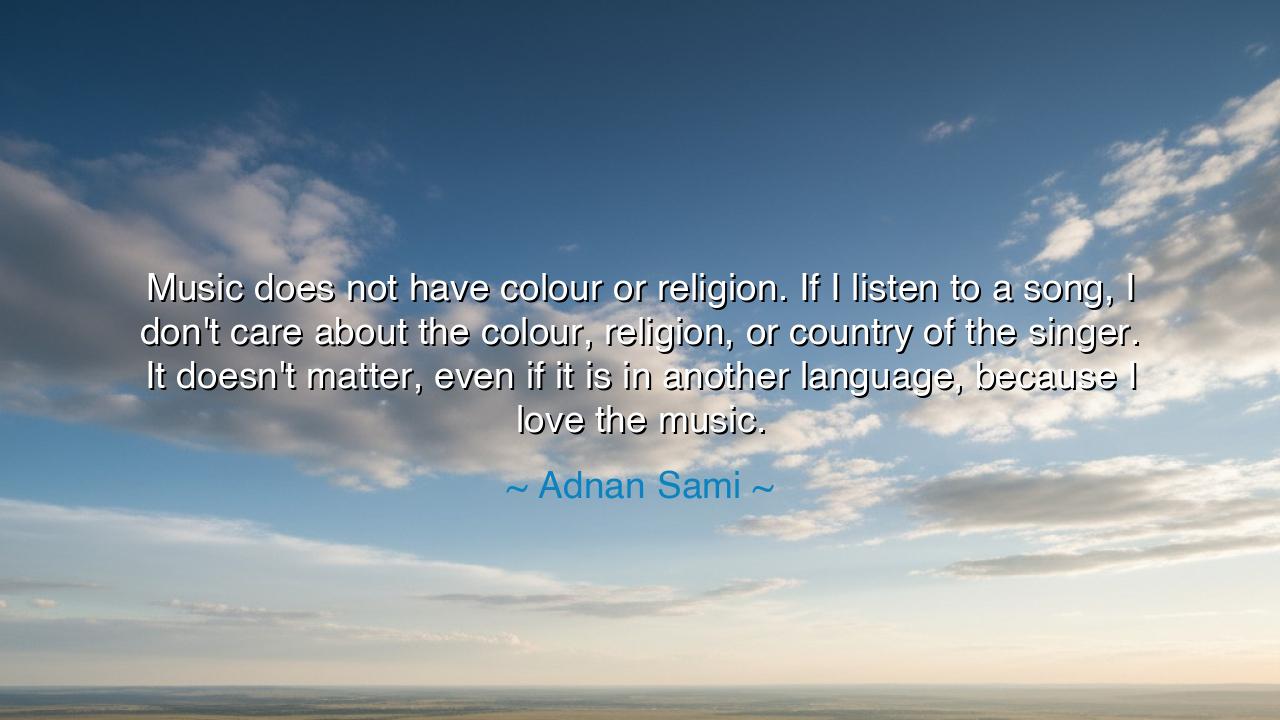
Music does not have colour or religion. If I listen to a song, I
Music does not have colour or religion. If I listen to a song, I don't care about the colour, religion, or country of the singer. It doesn't matter, even if it is in another language, because I love the music.






Hear now, O lover of harmony, the words of Adnan Sami: “Music does not have colour or religion. If I listen to a song, I don't care about the colour, religion, or country of the singer. It doesn't matter, even if it is in another language, because I love the music.” These words are not only the voice of a musician but the cry of the human soul, for music has always been more than sound—it is the purest bridge between hearts, beyond borders, beyond divisions, beyond the barriers men build among themselves.
Consider first the truth of music without colour or religion. Nations rise and fall, creeds divide, races clash, yet music flows like a river, carrying all people within its current. The drumbeat belongs to no single land, the flute is not bound by skin, the voice of a singer transcends the tongue in which it speaks. When we hear the cry of a violin, or the thunder of a choir, we do not ask what nation or what faith produced it. We feel. We are moved. Thus music unites where words divide, it heals where politics wound.
History bears witness. When Beethoven composed his Ninth Symphony, he wrote not only for Germans but for humanity itself. Its final chorus, the “Ode to Joy,” has since been sung in many tongues, across nations torn by war, across people long divided. In Japan, after the devastation of Hiroshima, it was sung as a hymn of peace; in Germany, it became a song of hope after tyranny; in the European Union, it stands as an anthem of unity. Who among them cared for Beethoven’s nationality? What mattered was the music, the universal language of the heart.
So too in the life of Miriam Makeba of South Africa, who carried the songs of her people against the chains of apartheid. Her voice rose not only for her nation but for all who suffered oppression. Though she sang in Xhosa, in Zulu, in tongues unknown to many of her listeners, her songs stirred hearts across the world. Those who heard her did not need to know the words—the truth was carried in the melody. This is the essence of Sami’s teaching: language and creed may divide, but music unites.
The meaning of this quote is profound: music is love made audible. It is the cry of the soul in a form that no boundary can silence. Where religion may be used as a sword, where race may be turned into a chain, where politics may be a wall, music breaks through. In the rhythm of song, the heart remembers that it belongs not to a nation, but to humanity. Music, in its purity, dissolves the false categories men cling to, and awakens the truth that we are one.
The lesson for us is clear: let music remind you of your shared humanity. Do not ask who made the song, but listen to what it awakens within you. Let your heart be stirred by a lullaby in a language you do not know, by a hymn of a faith not your own, by the drumbeat of a people far from your land. In such moments, you participate in the universal spirit, where love and beauty have no border.
Practical counsel follows. Open your ears to music from across the world. Let your playlists hold songs from distant lands, voices of unfamiliar tongues. Attend the concerts of those outside your tradition, and let your heart learn what your mind does not yet know. Share music with others, not as a possession, but as a gift that belongs to all. For when you embrace the songs of others, you embrace their humanity, and in doing so, dissolve the walls that divide.
Therefore, O child of rhythm and breath, remember Adnan Sami’s wisdom: music has no colour, no religion, no nation. It is the pure gift of the soul, a flame that belongs to all humanity. Love it, cherish it, and let it guide you into fellowship with the world. For where music is heard, division fades, and in its place rises harmony—the true song of life.






AAdministratorAdministrator
Welcome, honored guests. Please leave a comment, we will respond soon